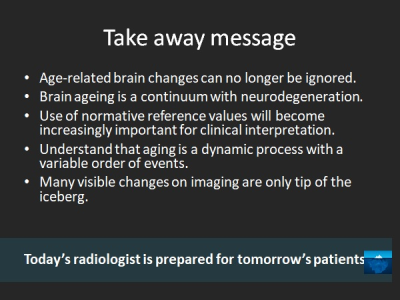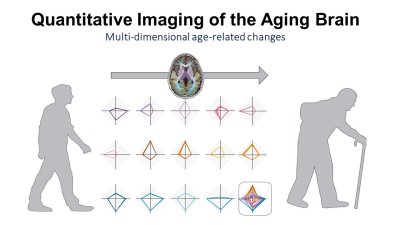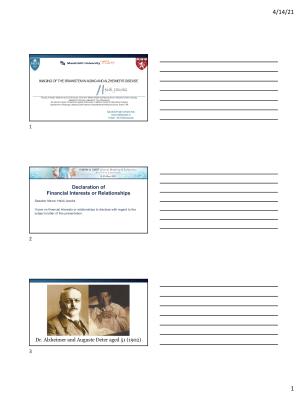Weekend Course
Neurodegeneration & Movement Disorders
ISMRM & SMRT Annual Meeting • 15-20 May 2021

| Concurrent 2 | 15:15 - 16:00 | Moderators: Fang Yu & Remika Mito |
 |
Imaging the Aging Brain: Changes Across the Lifespan Video Permission Withheld
Meike Vernooij
This lecture will describe typical structural brain changes seen on imaging studies in ageing. There is considerable overlap between patterns of brain pathology in ageing and neurodegeneration. Knowledge on changes in brain ageing is indispensable as a background against which to evaluate neurodegenerative disease. The ageing brain is likely affected by an accumulation of processes, the summation of which will lead to inter-individual differences in brain ageing, with some persons showing more ‘successful ageing’ than others. There is considerable research being conducted into understanding the biological basis for these differences.
|
|
 |
Quantitative Imaging of the Aging Brain
Aviv Mezer
Quantitative MRI (qMRI) techniques provide biophysical parametric measurements that are useful in the investigation and diagnosis of brain agingqMRI measurements display sensitivity to microstructural properties such as lipid and protein composition, iron content and cellular organization, therefore qMRI is termed in-vivo histology. I will present novel qMRI approaches for disentangling molecular composition of lipid and iron samples and identify region-specific molecular signatures across the brain and as function of aging. I will argue that the ability to disentangle molecular alterations from water-related changes opens the door to a more specific characterization of age-realted neurodegenerative disorder in-vivo.
|
|
| State-of-the-Art Structural & Functional Imaging of Alzheimer's Disease
Tammie Benzinger
|
||
 |
State-of-the-Art Imaging of the Brainstem (locus coeruleus) in Aging and Alzheimer’s Disease
Heidi Jacobs
Autopsy data suggests that several brainstem nuclei undergo morphological and molecular changes very early in life, making them an interesting target for the early detection of neurodegenerative diseases. However, imaging these nuclei is not easy, given their size and location. In this talk, I will review the methods that are currently available to structurally image some of these nuclei at the individual level, show some first results and its potential to improve the early detection of Alzheimer's disease. In addition, I will discuss approaches to functionally image these brainstem nuclei, as well the challenges for the future.
|
|
| State-of-the-Art Imaging of Movement Disorders Video Permission Withheld
Duygu Tosun
Neuroimaging offers a non-invasive approach to examining the potential utility of a vast number of functional and structural brain characteristics as biomarkers. Neuroimaging has been used in Parkinson disease research for 30 years, but no guidelines have yet endorsed its routine use in clinical settings. We will focus on the role of multimodal neuroimaging in differential diagnosis, monitoring disease progression, and monitoring non-motor cognitive dysfunction.
|
||
| Emerging Imaging Techniques in Dementia: The Role of PET-MRI & Novel Contrast Agents
Hongyu An
|
||
| Emerging Imaging Techniques in Dementia: Evaluating the Glymphatic System Video Unavailable
Laura Lewis
Waste clearance from the brain is important for maintaining healthy function, and disrupted clearance has been implicated in disorders such as Alzheimer’s disease. This educational lecture will focus on recent developments in MR techniques for imaging glymphatic function in the brain. It will highlight open scientific questions in this area and potential future applications in patients with neurodegenerative disorders.
|
||
| Emerging Imaging Techniques in Movement Disorders Video Unavailable
Maria Eugenia Caligiuri
In the last decades, MRI added value to diagnosing movement disorders has constantly increased. In this talk, the milestones and limitations of existing approaches are reviewed, emerging MR technologies for movement disorders are presented, and possible solutions to overcome existing limitations are proposed. The audience will learn to: i) describe the current status of imaging biomarkers in observational and interventional research of movement disorders; ii) describe advanced imaging techniques for diagnosis and management of movement disorders in a clinical and research environment/context; iii) identify appropriate imaging sequences to address given clinical questions in movement disorders
|
The International Society for Magnetic Resonance in Medicine is accredited by the Accreditation Council for Continuing Medical Education to provide continuing medical education for physicians.